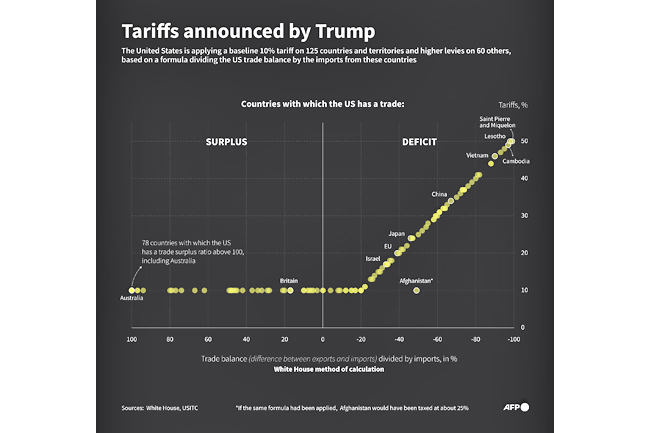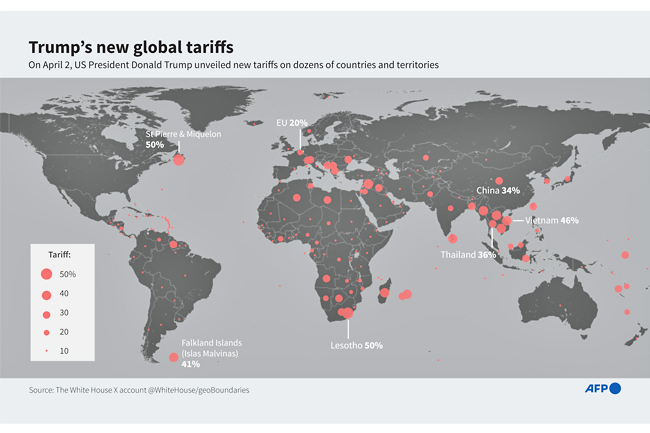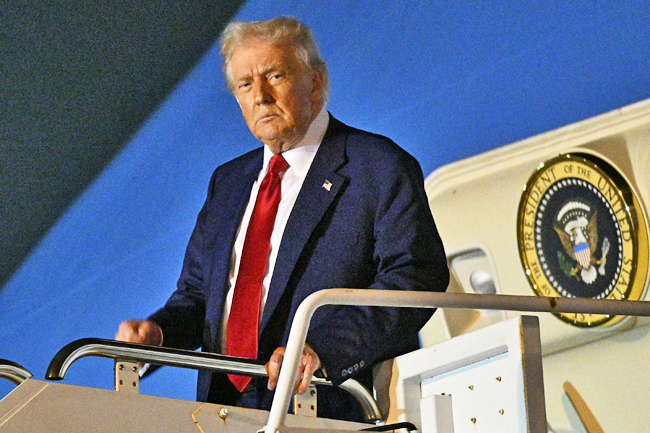AP – Asian shares slid further yesterday after United States (US) President Donald Trump’s tariffs sent shudders through financial markets at a level of shock unseen since the COVID-19 pummelled world markets in 2020.
Trump announced a minimum tariff of 10 per cent on global imports, with the tax rate running much higher on products from certain countries like China and those from the European Union. Smaller, poorer countries in Asia were slapped with tariffs as high as 49 per cent.
Everything from crude oil to Big Tech stocks to the value of the US dollar against other currencies has fallen. Even gold, a traditional safe haven that recently hit record highs, pulled lower after Trump announced his ‘Liberation Day’ set of tariffs, which economists said carries the risk of a potentially toxic mix of weakening economic growth and higher inflation.
Markets in Shanghai, Taiwan, Hong Kong and Indonesia were closed for holidays, limiting the scope of Friday’s sell-off.
CHINA CAR ASSOCIATION SAYS PRICES WILL GO UP
The China Association of Automobile Manufacturers called on the US to “correct its wrong actions”. It said the tariffs “will further raise car prices, and impose additional burdens on consumers in various countries including Americans and have a negative impact on global economic recovery”.
China is one of the major exporters of car parts, many used in car repairs. For example, about six in every 10 auto replacement parts used in US auto shop repairs are imported from Mexico, Canada and China. The new taxes are also estimated to make cars imported into the US thousands of dollars more expensive.
ASIAN SHARES SLIDE FURTHER, US DOLLAR TAKES A HIT
Asian shares slid further yesterday after US President Donald Trump’s tariffs even as markets in Shanghai, Hong Kong and Indonesia were closed for holidays, limiting the scope of yesterday’s sell-off.
Tokyo’s Nikkei 225 lost 4.3 per cent to 33,263.58, while South Korea’s Kospi sank 1.8 per cent to 2,441.86. The two US allies said they were focused on negotiating lower tariffs with Trump’s administration. Australia’s S&P/ASX 200 dropped 2.2 per cent to 7,684.30.
In other trading early yesterday, the US dollar fell to JPY145.39 from JPY146.06. The yen is often used as a refuge in uncertain times, while Trump’s policies are meant in part to weaken the dollar to make goods made in the US more price competitive overseas. The euro gained to USD1.1095 from USD1.1055.
NEW TARIFFS DESTROYED NORMAL ORDER OF TRADE WITH US: CHINESE INDUSTRY GROUPS
Chinese industry groups yesterday sharply criticised the US tariffs as well as the closing of the de minimis loophole which had allowed low value goods to be imported tax-free.
“America’s action crudely destroyed the normal order of trade between the US and China, severely impacted cooperation between global industries, and greatly harmed the rights of consumers, including American citizens,” said a statement from the China Light Industry Association, which represents the interests of light manufacturing businesses.
The tax exemption, which applies to packages valued at USD800 or less, has helped China-founded e-commerce companies like Shein and Temu to thrive while cutting into the US retail market. “We call on the international community to jointly resist this trade bullying, and firmly safeguard an equal and mutually beneficial international trade system.”
The China National Textile and Apparel Council chimed in as well, with a statement yesterday saying they “supported the Chinese government’s forceful measures” as the US has “Damaged the resilience of the global textile industry’s supply chain”.
VIETNAM SAYS TARIFFS FAIL TO REFLECT THE SPIRIT OF THE COMPREHENSIVE STRATEGIC PARTNERSHIP
Vietnam said it regretted the US decision to impose reciprocal tariff of 46 per cent on its exports to America.
“We believe that the decision is not in line with the reality of mutually beneficial economic and trade cooperation between the two countries,” spokesperson for Vietnam’s Foreign Ministry Pham Thu Hang said yesterday in a statement reported by state media.
She said Vietnam had actively engaged with the US to address concerns, promote ties on trade and work towards fair, mutually beneficial trade. She added that it failed to reflect the spirit of the comprehensive strategic partnership that the two countries had signed in 2023.
Former President Joe Biden visited Hanoi when the southeast Asian nation elevated the US to its highest diplomatic status, comprehensive strategic partner. At the time, Biden stressed this showed how far the relationship has evolved from what he described as the “bitter past” of the Vietnam War.
“If enforced, would negatively impact bilateral economic and trade relations as well as the interests of businesses and people in both countries,” said Hang.
The tariffs imposed on Vietnam are among the highest of any country, more than competitors like Thailand and Malaysia. Analysts said that the tariffs will harm Vietnamese export sectors like electronics, textiles, footwear and seafood.





